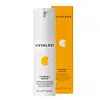What's inside
What's inside
 Key Ingredients
Key Ingredients

 Benefits
Benefits

 Concerns
Concerns

 Ingredients Side-by-side
Ingredients Side-by-side

Water
Skin ConditioningEthoxydiglycol
HumectantAscorbic Acid
AntioxidantGlycerin
HumectantFerulic Acid
AntimicrobialTocopheryl Acetate
AntioxidantTerminalia Ferdinandiana Fruit Extract
AntioxidantPichia/Resveratrol Ferment Extract
Skin ConditioningPhaeodactylum Tricornutum Extract
HumectantSodium Ascorbyl Phosphate
AntioxidantSodium Hyaluronate
HumectantCitrus Australasica Fruit Extract
AntioxidantBackhousia Citriodora Leaf/Twig Water
MaskingPentylene Glycol
Skin ConditioningGluconolactone
Skin ConditioningPolysorbate 20
EmulsifyingCitrus Sinensis Peel Oil Expressed
PerfumingEugenia Caryophyllus Leaf Oil
MaskingLavandula Angustifolia Flower Extract
CleansingLavandula Hybrida Oil
EmollientCitrus Limon Fruit Oil
AstringentDehydroacetic Acid
PreservativeBenzyl Alcohol
PerfumingCalcium Gluconate
HumectantLimonene
PerfumingEugenol
PerfumingLinalool
PerfumingPotassium Sorbate
PreservativeSodium Benzoate
MaskingCitric Acid
BufferingWater, Ethoxydiglycol, Ascorbic Acid, Glycerin, Ferulic Acid, Tocopheryl Acetate, Terminalia Ferdinandiana Fruit Extract, Pichia/Resveratrol Ferment Extract, Phaeodactylum Tricornutum Extract, Sodium Ascorbyl Phosphate, Sodium Hyaluronate, Citrus Australasica Fruit Extract, Backhousia Citriodora Leaf/Twig Water, Pentylene Glycol, Gluconolactone, Polysorbate 20, Citrus Sinensis Peel Oil Expressed, Eugenia Caryophyllus Leaf Oil, Lavandula Angustifolia Flower Extract, Lavandula Hybrida Oil, Citrus Limon Fruit Oil, Dehydroacetic Acid, Benzyl Alcohol, Calcium Gluconate, Limonene, Eugenol, Linalool, Potassium Sorbate, Sodium Benzoate, Citric Acid
 Reviews
Reviews

Ingredients Explained
These ingredients are found in both products.
Ingredients higher up in an ingredient list are typically present in a larger amount.
Ascorbic Acid is is pure Vitamin C. This form makes up the largest amount of vitamin C found naturally in our skin.
Not only is vitamin C great for your overall health and immune system, it also has plenty of benefits on your skin.
Vitamin C is best used for brightening skin. It improves dark spots, acne scars, and hyperpigmentation. This is because it blocks the process of skin darkening when exposed to UV.
Remember: Vitamin C should not replace sunscreen!
Your skin uses vitamin C to build collagen. Collagen is one key component in having a strong skin barrier and plump skin. Vitamin C also plays a role in regulating collagen, thus making it effective in improving wrinkles and fine lines.
Ascorbic acid shows potent antioxidant activity. As an antioxidant, it helps fight free-radicals. Free-radicals are molecules that may damage your skin cells. These antioxidants also protect skin against UV damage.
The best formulations include Vitamin E and/or ferulic acid. These two ingredients help stabilize and provide a boost in the benefits of ascorbic acid. This is because ascorbic acid becomes unstable when exposed to UV and air. In fact, you can tell your ascorbic acid has oxidized when it turns an orange-yellow color.
Ascorbic acid is generally compatible with other ingredients. However, using ascorbic acid with other active ingredients might cause irritation. Two ingredients: copper ions and benzoyl peroxide, will inactivate ascorbic acid completely.
Read more about other types of Vitamin C:
Foods rich with vitamin C include oranges, strawberries, broccoli, bell peppers, and more. When consuming Vitamin C, your skin receives a portion of the nutrients.
Learn more about Ascorbic AcidBenzyl Alcohol is most commonly used as a preservative. It also has a subtle, sweet smell. Small amounts of Benzyl Alcohol is not irritating and safe to use in skincare products. Most Benzyl Alcohol is derived from fruits such as apricots.
Benzyl Alcohol has both antibacterial and antioxidant properties. These properties help lengthen the shelf life of products. Benzyl Alcohol is a solvent and helps dissolve other ingredients. It can also improve the texture and spreadability.
Alcohol comes in many different forms. Different types of alcohol will have different effects on skin. This ingredient is an astringent alcohol.
Using high concentrations of these alcohols are drying on the skin. They may strip away your skin's natural oils and even damage your skin barrier. Astringent alcohols may also irritate skin.
Other types of astringent alcohols include:
According to the National Rosacea Society based in the US, you should be mindful of products with these alcohols in the top half of ingredients.
Any type of sanitizing product will have high amounts of alcohol to help kill bacteria and viruses.
Learn more about Benzyl AlcoholDehydroacetic Acid is fungicide and bactericide. It is used as a preservative in cosmetics. Preservatives help elongate the shelf life of a product.
Dehydroacetic Acid is not soluble in water.
Ethoxydiglycol is a synthetic solvent.
Solvents are used to keep ingredients together in a product. They can help dissolve ingredients to stable bases or help evenly distribute ingredients throughout the product.
Ethoxydiglycol also helps deliver other key ingredients into the skin.
Learn more about EthoxydiglycolFerulic Acid is a plant based antioxidant. By fighting free-radicals, ferulic acid can help reduce the formation of fine lines and hyperpigmentation.
When used with Vitamin C, Ferulic Acid has shown to prevent Vitamin C from breaking down. In other words, it acts as a stabilizer.
Ferulic Acid is sometimes used to preserve food. Foods containing Ferulic Acid include: oats, rice, eggplant, citrus.
In medicine, Ferulic Acid is being studied for helping with diabetes, Alzheimer's, and cardiovascular diseases.
Learn more about Ferulic AcidSodium Hyaluronate is hyaluronic acid's salt form. It is commonly derived from the sodium salt of hyaluronic acid.
Like hyaluronic acid, it is great at holding water and acts as a humectant. This makes it a great skin hydrating ingredient.
Sodium Hyaluronate is naturally occurring in our bodies and is mostly found in eye fluid and joints.
These are some other common types of Hyaluronic Acid:
Learn more about Sodium HyaluronateWater. It's the most common cosmetic ingredient of all. You'll usually see it at the top of ingredient lists, meaning that it makes up the largest part of the product.
So why is it so popular? Water most often acts as a solvent - this means that it helps dissolve other ingredients into the formulation.
You'll also recognize water as that liquid we all need to stay alive. If you see this, drink a glass of water. Stay hydrated!
Learn more about Water